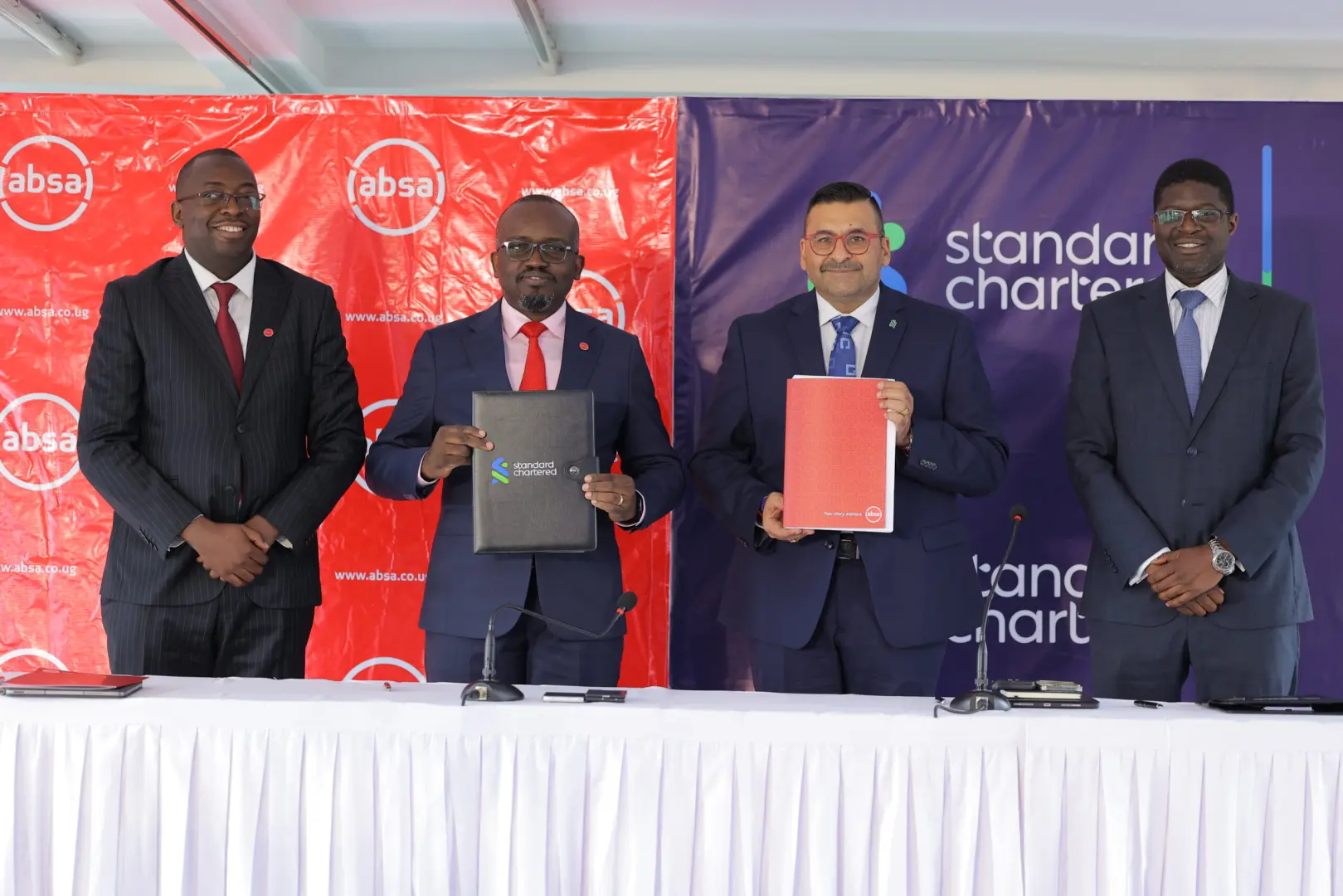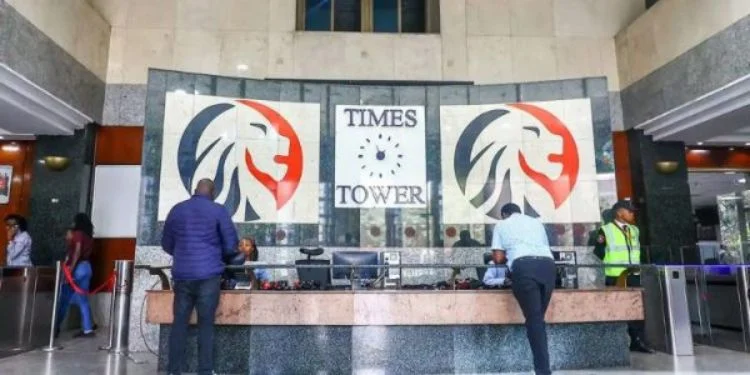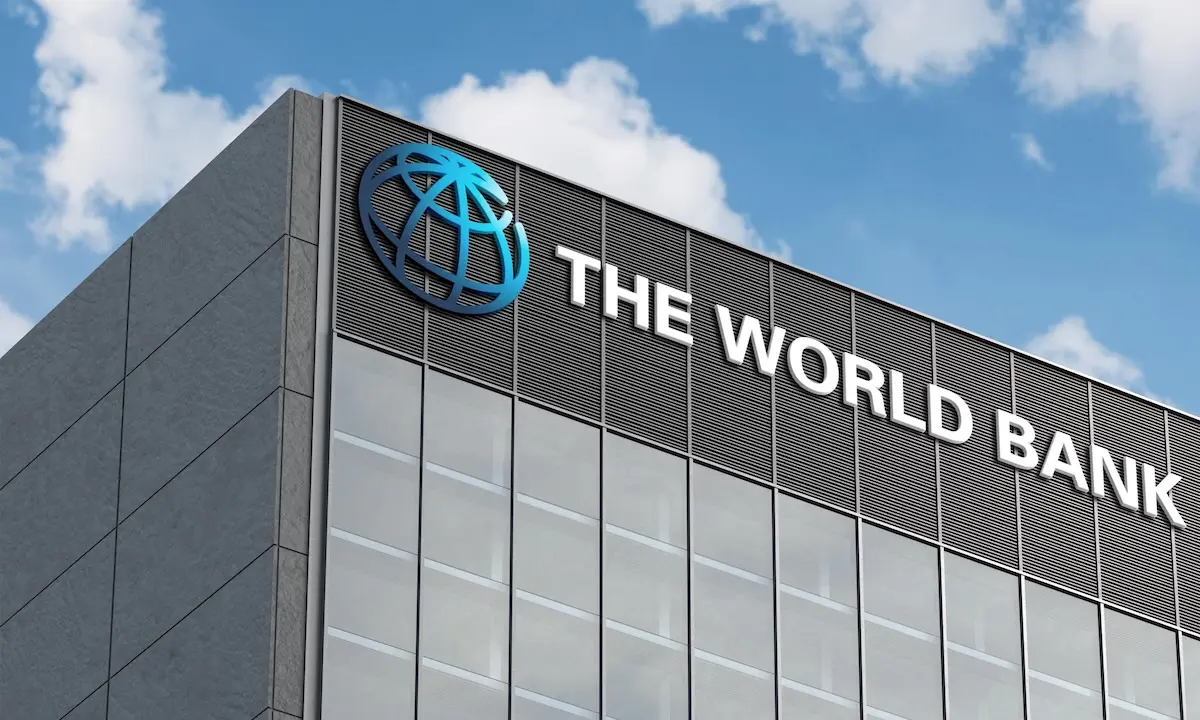Standard Chartered has agreed to divest its wealth and retail banking business in Uganda to South African financial institution Absa Group for an undisclosed amount, marking another significant milestone in the British bank’s strategic retreat from smaller African retail markets. The transaction, announced on Friday, October 25, 2025, comes as both institutions pursue fundamentally different visions for their African operations.
Build the future you deserve. Get started with our top-tier Online courses: ACCA, HESI A2, ATI TEAS 7, HESI EXIT, NCLEX-RN, NCLEX-PN, and Financial Literacy. Let Serrari Ed guide your path to success. Enroll today.
Strategic Realignment Under Bill Winters
The Uganda transaction represents the latest chapter in Standard Chartered’s comprehensive business overhaul under Chief Executive Officer Bill Winters, who has been systematically reshaping the bank since taking the reins in June 2015. Last year, the London-headquartered financial institution announced its intention to exit wealth and retail banking operations not only in Uganda but also in Botswana and Zambia, reflecting a deliberate pivot toward more profitable market segments and geographic focus areas.
Standard Chartered’s decision aligns with a broader industry trend seeing Western banks reassess their retail banking footprints across Africa. The bank’s strategy emphasizes concentration on markets where it maintains what Winters describes as a “distinctive client proposition,” particularly in affluent, cross-border, and institutional banking segments where Standard Chartered can leverage its unique strengths as an Asia-focused lender with deep expertise in emerging markets.
Kariuki Ngari, Chief Executive Officer of Standard Chartered Kenya and Africa, characterized the sale as “an important milestone as we continue to accelerate income growth and returns.” This statement reflects the bank’s ongoing commitment to enhancing profitability by concentrating resources in areas where it can achieve superior financial performance and sustainable competitive advantages.
Bill Winters’ Transformation Agenda
Since Winters assumed leadership nearly a decade ago, Standard Chartered has undergone a fundamental transformation. The CEO, who previously served as co-head of JPMorgan Chase’s investment bank before founding private credit fund Renshaw Bay, brought a disciplined approach to capital allocation and strategic focus that has gradually reshaped the institution’s global footprint.
Under Winters’ stewardship, the bank has systematically de-risked its balance sheet, addressed legacy issues from the financial crisis, and refocused on core strengths. In 2024, Standard Chartered announced organizational changes designed to create a simpler, more efficient structure with clearer accountabilities across business lines. The bank removed regional dimensions from its management structure to better drive global priorities through each business line into the markets where they operate.
The transformation has begun yielding results. Standard Chartered reported better-than-expected profits in July after successfully scaling back less-profitable operations and intensifying its focus on affluent customers and international corporate clients. The bank upgraded its 2024 operating income growth guidance to approximately 10%, up from a prior estimate of above 7%, and announced plans to distribute at least $8 billion in shareholder dividends through 2026, increased from a previously announced $5 billion.
Absa’s Uganda Acquisition: Details and Implications
Under the terms of the agreement, Absa Bank Uganda will assume Standard Chartered’s complete retail and wealth management portfolio in the country, while the Asia-focused British bank will retain its Corporate and Investment Banking (CIB) arm in Uganda. This structure ensures Standard Chartered maintains its presence serving large local and multinational companies, institutional clients, and international corporates requiring cross-border capabilities—segments where the bank maintains genuine competitive differentiation.
The transaction remains subject to regulatory approval from Uganda’s financial authorities. Once approvals are secured, all of Standard Chartered’s wealth and retail banking clients and employees will transfer to Absa, significantly expanding the South African lender’s customer base and market position in Uganda. David Wandera, Managing Director of Absa Bank Uganda, described the acquisition as “a significant milestone in our journey to become a market leader in providing innovative, customer-centric financial solutions.”
Understanding Uganda’s Competitive Banking Landscape
Uganda’s banking sector has long been characterized by intense competition among numerous institutions vying for market share in a relatively constrained market. With approximately 25 banks operating in the country, economic analysts have questioned whether the market can sustainably support such fragmentation. Fred Muhumuza, an economic analyst quoted in local media, observed that “26 banks for a market like Uganda is high,” highlighting the structural pressures driving consolidation.
The acquisition positions Absa to potentially become one of Uganda’s largest retail banking players by customer base, joining the ranks of dominant institutions including Stanbic Bank, Centenary Bank, DFCU Bank, and Equity Bank. Uganda’s top five banks have been engaged in fierce competition for scale and market dominance, with the middle ground increasingly untenable. Banks must either grow substantially or face gradual marginalization—a dynamic that makes Standard Chartered’s premium retail portfolio particularly valuable to Absa’s growth strategy.
Standard Chartered’s exit from Uganda retail banking concludes more than a century of presence in the market, during which the institution built a formidable reputation serving high-net-worth clients, affluent individuals, and corporate customers. However, operational economics have shifted dramatically. Rising costs, evolving consumer behaviors favoring digital channels, and the capital-intensive nature of retail banking in fragmented markets have made such operations less attractive to global banks seeking to optimize returns.
Kenny Fihla’s Vision for Absa’s Pan-African Growth
The Uganda acquisition represents Absa’s first major deal under new Group CEO Kenny Fihla, who assumed leadership on June 17, 2025, after being recruited from larger rival Standard Bank Group. Fihla brings nearly 20 years of experience in leadership roles within the banking sector, including serving as CEO of Standard Bank’s Corporate and Investment Banking division and Deputy Chief Executive Officer overseeing the bank’s subsidiaries outside South Africa.
Charles Russon, Absa Group Executive for Africa Regions, emphasized that the transaction “supports Absa’s strategic Pan-African growth ambitions and further strengthens our position in Uganda’s financial services landscape. It will enable Absa Uganda to broaden its retail and wealth management offerings and deliver increased convenience and value to our customers.”
Fihla’s appointment followed a tumultuous period for Absa, which has seen six chief executives since the retirement of Maria Ramos in 2019. This leadership instability—encompassing two permanent CEOs and three interim leaders over just five years—significantly impacted the bank’s profitability and strategic execution. The churning of senior management made Absa one of the worst performers among Africa’s nine largest lenders, with its return on equity (ROE) lagging competitors like Capitec Bank, which achieved 29% ROE compared to Absa’s 14.8%.
Absa’s Recovery Strategy and Leadership Stability
Fihla has articulated a comprehensive strategy focused on bringing stability to the organization, modernizing retail operations, enhancing digital capabilities, and executing an aggressive Pan-African expansion. His vision includes transforming Absa’s retail unit into South Africa’s largest by customer count, currently at approximately 10 million active clients compared to Capitec’s 24.1 million. He has also committed to spending 30% of his time directly with clients to better understand their needs and ensure the organization maintains external focus.
The CEO acknowledges the challenges created by successive leadership changes. “This used to be an unbelievable institution and still is in many respects,” Fihla stated in his first interview after taking over. “But unfortunately, some of the challenges of successive leadership changes resulted in the organisation losing its sharpness when it comes to that external focus.”
Management stability is central to Fihla’s approach. He plans to announce permanent executives for the bank’s retail and corporate and investment banking units, which currently operate under acting leadership. These permanent leaders will bear responsibility for operations across all regions, ensuring the organization moves cohesively rather than in divergent directions based on geography. Fihla has cited institutions like JPMorgan Chase and, notably, Standard Chartered as exemplars of banks that have been “exceptionally good” at maintaining consistent client treatment across geographies.
Strategic Assets in the Standard Chartered Portfolio
The acquisition delivers Absa more than just customer accounts and deposits. Standard Chartered’s SC Shilingi platform, Uganda’s pioneering digital wealth-distribution channel, represents a particularly valuable asset. Unlike traditional unit trusts, SC Shilingi connects everyday savers to investment opportunities through the Sanlam Umbrella Fund, effectively bridging formal and retail investing in ways that democratize wealth creation for ordinary Ugandans.
Denis Kizito, director of market supervision at Uganda’s Capital Markets Authority, noted that “Absa’s acquisition of custodial services, alongside the Shilingi platform, expands its presence in capital markets. It will allow the bank to offer both investment advisory and custodial solutions, strengthening non-interest income.” This capability positions Absa as a full-cycle player in capital markets, able to distribute, manage, and safeguard assets under a single framework—a competitive advantage few institutions in the market currently possess.
Standard Chartered’s affluent customer base also offers Absa instant credibility and access to Uganda’s top-tier retail and wealth clients. The acquired portfolio comprises low-risk, high-value relationships that boost revenue without substantially increasing default risk—particularly important given that Absa’s non-performing loans reached 212 billion Ugandan shillings by the end of 2024, triple Stanbic’s level, indicating that aggressive balance sheet growth has come with elevated credit risk.
One decision can change your entire career. Take that step with our Online courses in ACCA, HESI A2, ATI TEAS 7, HESI EXIT, NCLEX-RN, NCLEX-PN, and Financial Literacy. Join Serrari Ed and start building your brighter future today.
Absa’s Broader East African Presence
Absa maintains a significant presence across East Africa, with operations in Kenya, Uganda, and Tanzania. In August 2025, Fihla indicated that the bank is exploring opportunities to merge its two separate operations in Tanzania to achieve greater operational efficiency and scale. He also expressed interest in expanding into larger markets where Absa currently lacks presence, particularly Nigeria, where the bank maintains only a representative office. “We’d want to do more,” Fihla noted, “but the environment must be right before we can think about significant scaling up.”
Uganda holds particular strategic importance. Before the Standard Chartered acquisition, Absa was already the third-largest bank in Uganda. The transaction creates “a massive opportunity to increase our market share quite significantly and become the number one bank in Uganda,” as Fihla articulated in August 2025. The ambition reflects Absa’s confidence in Uganda’s economic trajectory and its determination to achieve market leadership through strategic acquisitions that complement organic growth initiatives.
Western Banks’ African Retail Banking Retreat
Standard Chartered’s Uganda exit exemplifies a broader pattern of Western financial institutions reassessing their African retail banking strategies. A September 2024 report by Moody’s found that Western banks doing business in Africa are struggling to crack the retail banking segment as domestic and regional players increasingly dominate these markets with better local knowledge, lower cost structures, and greater agility.
Major international banking groups including Barclays, BNP Paribas, Crédit Agricole, Groupe BPCE, HSBC, Société Générale, and Standard Chartered have either completely exited African markets or substantially scaled down their exposure to the continent. These institutions have found it increasingly difficult to compete effectively against well-established local banks and aggressive regional players who understand local market dynamics, regulatory environments, and customer preferences more intimately.
The retreat reflects several interconnected factors: rising operational costs in smaller markets, intense competition from domestic institutions with structural cost advantages, regulatory complexity across multiple jurisdictions, and the capital-intensive nature of building and maintaining retail banking networks. For global banks, the strategic calculus increasingly favors focusing resources on markets where they possess genuine competitive advantages, typically in corporate banking, investment banking, and specialized financial services.
Standard Chartered’s Previous African Divestments
The Uganda transaction follows Standard Chartered’s established pattern of strategic African divestments. In June 2025, the bank completed the transfer of its wealth and retail banking business in Tanzania to Access Bank PLC, concluding a strategic divestiture announced in April 2022. That transaction similarly allowed Standard Chartered to exit retail banking while maintaining its corporate and investment banking presence to serve institutional and multinational corporate clients.
Standard Chartered has also divested shareholdings in subsidiaries across Angola, Cameroon, The Gambia, and Sierra Leone as part of its broader African restructuring. The pattern reveals a consistent strategy: exit markets where retail banking operations lack sufficient scale or profitability while maintaining corporate and investment banking capabilities in locations that serve the bank’s affluent, international, and institutional client base.
This selective approach enables Standard Chartered to remain an important financial institution across Africa without bearing the full costs and complexities of comprehensive retail banking networks. The bank’s corporate and investment banking operations can focus on supporting trade flows, providing sophisticated financial services to large corporations, and facilitating cross-border transactions—areas where Standard Chartered’s global network and expertise create genuine value for clients and superior returns for shareholders.
Financial Performance and Market Position
Standard Chartered’s strategic realignment has contributed to improved financial performance. Beyond better-than-expected July profits, the bank has successfully executed a cross-border-focused strategy within its Corporate and Investment Banking segment, planning to increase the cross-border share of CIB income from 61% in 2023 to approximately 70% in the medium term. This involves increasingly focusing on larger global clients requiring sophisticated cross-border capabilities, while deliberately exiting around 3,000 CIB clients—roughly a quarter of the total—whose needs don’t align with the bank’s core strengths.
For Absa, the acquisition comes as the South African bank reported a 17% increase in headline earnings for the first half of 2025, with credit impairments declining 14% and playing a significant role in delivering earnings growth. The bank implemented a robust collections strategy, enhanced credit models, and changed new-business lending criteria, particularly in vehicle asset finance and unsecured lending. These improvements helped reduce Absa’s credit-loss ratio to 100 basis points, at the top end of its through-the-cycle target range.
Absa finished 2024 with 4.2 trillion Ugandan shillings in assets and 1 trillion in borrowings, operating one of Uganda’s most aggressive balance sheets. Its non-interest income of 230.2 billion shillings trails only market leader Stanbic but outpaces both Equity and DFCU banks, demonstrating the bank’s capacity for revenue diversification beyond traditional lending margins.
Absa’s Post-Barclays Evolution
Absa has been working diligently to restore stability and grow its retail business following its separation from former British parent Barclays, a complex process executed over three years concluding in 2020. The separation from Barclays required substantial investment in technology systems, rebranding, and operational independence, all while maintaining business continuity and customer service quality. The transition period coincided with leadership instability that complicated execution, but the bank has emerged as an independent African financial services group with ambitions matching its scale.
South Africa’s third-largest bank by assets now operates across 16 African countries, including presence in Botswana, Ghana, Kenya, Mauritius, Mozambique, Seychelles, Tanzania, Uganda, and Zambia. This Pan-African footprint provides diversification benefits and positions Absa to capture growth opportunities across multiple economies at varying stages of development. The geographic spread also allows the bank to serve multinational corporations and facilitate intra-African trade and investment flows, complementing its retail banking ambitions with corporate and investment banking capabilities.
Regulatory Approval Process and Timeline
While both parties have signed the agreement, the transaction’s completion remains contingent upon receiving necessary regulatory approvals from Uganda’s financial sector authorities. This standard requirement ensures that the Central Bank of Uganda and other relevant regulators review the transaction’s implications for financial stability, consumer protection, and market competition. Regulatory authorities typically assess the acquiring bank’s financial strength, its plans for maintaining service quality, and its ability to honor commitments to acquired customers and employees.
Once regulatory approvals are secured, Standard Chartered’s wealth and retail banking clients will begin transitioning to Absa. Both institutions have pledged to ensure a smooth transition that minimizes disruption for customers, who will continue accessing their funds and services throughout the handover period. Standard Chartered and Absa will coordinate closely to transfer accounts, migrate data systems, and ensure that customer relationships receive appropriate attention during what can be a sensitive transition period.
Implications for Uganda’s Banking Sector Consolidation
The transaction may signal the beginning of broader consolidation within Uganda’s fragmented banking sector. With 25 to 26 banks competing for market share in a relatively small economy, industry observers have long anticipated that market forces would drive consolidation as weaker institutions struggle to achieve sustainable scale and profitability. In 2024, three banks—Opportunity Bank, Guaranty Trust Bank, and ABC Capital—were downgraded to credit institutions after failing to meet capital requirements, illustrating the pressures facing smaller market participants.
Absa’s decision to acquire Standard Chartered’s premium portfolio rather than distressed institutions reflects a strategic preference for quality over opportunistic acquisitions. The move positions Absa for sustainable competitive advantage based on superior customer relationships, valuable digital platforms, and expanded capabilities rather than simply adding troubled assets that would require extensive turnaround efforts.
As market dynamics continue evolving, additional consolidation appears likely. Banks lacking sufficient scale, digital capabilities, or specialized market positions may find it increasingly difficult to compete against larger, better-capitalized institutions with superior technology platforms and more comprehensive product offerings. This consolidation could ultimately benefit Uganda’s financial sector by creating stronger institutions better equipped to support economic development through increased lending capacity and improved service quality.
Looking Ahead: Strategic Priorities for Both Banks
For Standard Chartered, the Uganda divestment advances CEO Bill Winters’ vision of a more focused, profitable institution concentrated on markets and client segments where it possesses distinctive competitive advantages. The bank will continue serving Ugandan corporate and institutional clients requiring sophisticated cross-border capabilities, international trade finance, and treasury services—areas where Standard Chartered’s global network and expertise create genuine value impossible for purely domestic institutions to replicate.
For Absa under Kenny Fihla’s leadership, the acquisition represents an important step toward achieving market leadership in key African markets while building the scale necessary to justify continued investment in digital platforms, product innovation, and customer service excellence. Success will require not just integrating the acquired portfolio but also leveraging it to accelerate the bank’s broader transformation agenda of customer-centricity, digital excellence, and operational efficiency.
The transaction ultimately reflects complementary strategic visions: Standard Chartered optimizing its African presence around institutional and corporate banking excellence, while Absa builds a Pan-African retail and commercial banking powerhouse capable of serving diverse customer segments across multiple markets. Both strategies appear rational responses to competitive dynamics, regulatory environments, and shareholder expectations shaping modern African banking.
Ready to take your career to the next level? Join our Online courses: ACCA, HESI A2, ATI TEAS 7 , HESI EXIT , NCLEX – RN and NCLEX – PN, Financial Literacy!🌟 Dive into a world of opportunities and empower yourself for success. Explore more at Serrari Ed and start your exciting journey today! ✨
Track GDP, Inflation and Central Bank rates for top African markets with Serrari’s comparator tool.
See today’s Treasury bonds and Money market funds movement across financial service providers in Kenya, using Serrari’s comparator tools.
photo source: Google
By: Montel Kamau
Serrari Financial Analyst
28th October, 2025
Article, Financial and News Disclaimer
The Value of a Financial Advisor
While this article offers valuable insights, it is essential to recognize that personal finance can be highly complex and unique to each individual. A financial advisor provides professional expertise and personalized guidance to help you make well-informed decisions tailored to your specific circumstances and goals.
Beyond offering knowledge, a financial advisor serves as a trusted partner to help you stay disciplined, avoid common pitfalls, and remain focused on your long-term objectives. Their perspective and experience can complement your own efforts, enhancing your financial well-being and ensuring a more confident approach to managing your finances.
Disclaimer: This article is for informational purposes only and does not constitute financial advice. Readers are encouraged to consult a licensed financial advisor to obtain guidance specific to their financial situation.
Article and News Disclaimer
The information provided on www.serrarigroup.com is for general informational purposes only. While we strive to keep the information up to date and accurate, we make no representations or warranties of any kind, express or implied, about the completeness, accuracy, reliability, suitability, or availability with respect to the website or the information, products, services, or related graphics contained on the website for any purpose. Any reliance you place on such information is therefore strictly at your own risk.
www.serrarigroup.com is not responsible for any errors or omissions, or for the results obtained from the use of this information. All information on the website is provided on an as-is basis, with no guarantee of completeness, accuracy, timeliness, or of the results obtained from the use of this information, and without warranty of any kind, express or implied, including but not limited to warranties of performance, merchantability, and fitness for a particular purpose.
In no event will www.serrarigroup.com be liable to you or anyone else for any decision made or action taken in reliance on the information provided on the website or for any consequential, special, or similar damages, even if advised of the possibility of such damages.
The articles, news, and information presented on www.serrarigroup.com reflect the opinions of the respective authors and contributors and do not necessarily represent the views of the website or its management. Any views or opinions expressed are solely those of the individual authors and do not represent the website's views or opinions as a whole.
The content on www.serrarigroup.com may include links to external websites, which are provided for convenience and informational purposes only. We have no control over the nature, content, and availability of those sites. The inclusion of any links does not necessarily imply a recommendation or endorsement of the views expressed within them.
Every effort is made to keep the website up and running smoothly. However, www.serrarigroup.com takes no responsibility for, and will not be liable for, the website being temporarily unavailable due to technical issues beyond our control.
Please note that laws, regulations, and information can change rapidly, and we advise you to conduct further research and seek professional advice when necessary.
By using www.serrarigroup.com, you agree to this disclaimer and its terms. If you do not agree with this disclaimer, please do not use the website.
www.serrarigroup.com, reserves the right to update, modify, or remove any part of this disclaimer without prior notice. It is your responsibility to review this disclaimer periodically for changes.
Serrari Group 2025
















